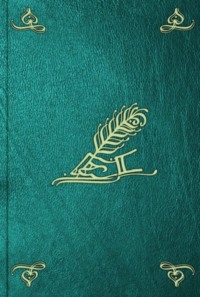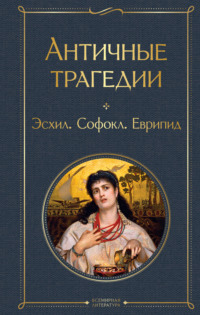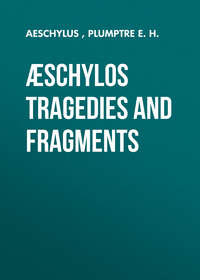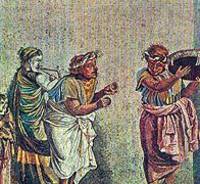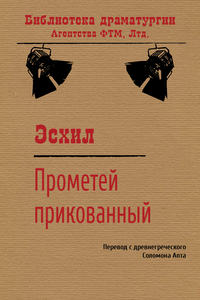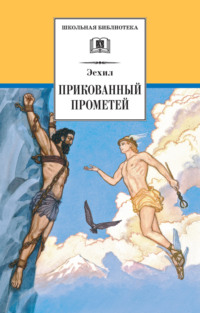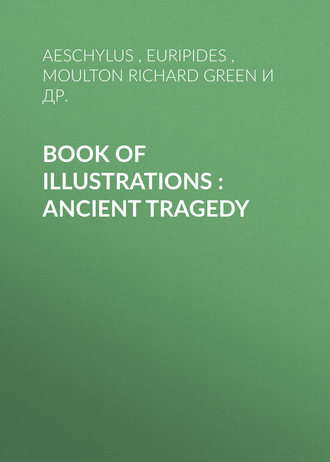 полная версия
полная версияBook of illustrations : Ancient Tragedy

Aeschylus
Book of illustrations : Ancient Tragedy
REFERENCES
In the case of Aeschylus and Sophocles the numbering of lines agrees with that in the translations of Plumptre and in the original. In the plays from Euripides the numbering is that of the lines in the cheap translation (Routledge's Universal Library).
[Transcriber's note: In the original book, the line numbers mentioned above were right-justified. In this e-book, they are enclosed in curly braces, and placed immediately after their associated line of text, e.g. ".. a line of text {123}".]
The passages quoted are from Plumptre's Translation
MEMORANDUM
The Sacred Legends touched by this Trilogy would be familiar, in outline, to the Auditors: e. g.:
The woes of the House of Atreus: the foundation of them laid by Atreus when, to take vengeance on his brother Thyestes, he served up to him at a banquet the flesh of his own sons;
His grandsons were Agamemnon and Menelaus: Menelaus' wife, Helen, was stolen by a guest, Paris of Troy, which caused the great Trojan war.
Agamemnon, who commanded the Greek nations in that war, fretting at the contrary winds which delayed the setting out of the fleet, was persuaded by the Seers to slay his own daughter Iphigenia, to appease the Deities;
Her mother Clytaemnestra treasured up this wrong all through the ten years' war, and slew Agamemnon on his return, in the moment of victory, slew him while in his bath by casting a net over him and smiting him to death with her own arm;
Then she reigned in triumph with Aegisthus her paramour (himself one of the fatal house), till Orestes her son, who had escaped as an infant when his father was slaughtered, returned at last, and slew the guilty pair;
For this act of matricide, though done by the command of Apollo, Orestes was given up to the Furies, and driven over the earth, a madman, till in Athens, on Mars' Hill they say, he was cleansed and healed.
Cassandra too was involved in the fall of Agamemnon: the Trojan maiden beloved of Apollo, who bestowed upon her the gift of prophecy; when she slighted the God's love, Apollo – for no gift of a god can be recalled – left her a prophetess, with the doom that her true forebodings should ever be disbelieved. She, having thus vainly sought to save Troy, with its fall fell into captivity, and to the lot of Agamemnon, with whom she died.
The name of Orestes would suggest the proverbial friendship of Qrestes [Transcriber's note: Orestes?] and Pylades, formed in Orestes' trouble and never broken.
TRILOGY OF THE ORESTEIA
FIRST PLAY: IN THE MORNING:
AGAMEMNON
PROLOGUEThe Permanent Scene is decorated to represent the facade of the Palace of Agamemnon, at Argos; the platform over the Central door appearing as a Watch-tower. At intervals along the front of the Palace, and especially by the three doors, are statues of Gods, amongst them Apollo, Zeus, and Hermes. The time is supposed to be night, verging on morning. Both Orchestra and Stage are vacant: only a Watchman is discovered on the Tower, leaning on his elbow, and gazing into the distance.
The Watchman soliloquizes on his toilsome task of watching all night through for the first sight of the signal which is to tell of the capture of Troy: he has kept his post for years, till the constellations which usher in winter and harvest-time are his familiar companions; he must endure weather and sleeplessness, and when he would sing to keep his spirits up he is checked by thoughts of his absent master's household, in which, he darkly hints, things are "not well." [He is settling himself into an easier posture, when suddenly he springs to his feet.] The beacon-fire at last! [He shouts the signal agreed upon, and begins dancing for joy.] Now all will be well; a little while and his hand shall touch the dear hand of his lord; and then – ah! "the weight of an ox rests on his tongue," but if the house had a voice it could tell a tale! [Exit to bring tidings to the queen.] {39}
PARODE, OR CHORUS-ENTRYAs if roused by the Watchman's shout, enter the Chorus: Twelve Elders of Argos: in the usual processional order, combining music, chanting and gesture-dance, to a rhythm conventionally associated with marching. They enter on the right (as if from the city), and the Processional Chant takes them gradually round the Orchestra towards the Thymele, or Altar of Dionysus, in the centre.
The Chorus in their Processional Chant open the general state of affairs, especially bringing out the doublesidedness of the situation [which is the key-note of the whole Drama]: the expected triumph over Troy, which cannot be far distant now, combined with misgivings as to misfortunes sure to come as nemesis for the dark deeds connected with the setting out of the expedition. They open thus:
Lo! the tenth year now is passing {40} Since, of Priam great avengers, Menelaos, Agamemnon, Double-throned and double-sceptred, Power from sovran Zeus deriving — Mighty pair of the Atreidae — Raised a fleet of thousand vessels Of the Argives from our country, Potent helpers in their warfare, Shouting cry of Ares fiercely; E'en as vultures shriek who hover, Wheeling, whirling o'er their eyrie, {50} In wild sorrow for their nestlings, With their oars of stout wings rowing, Having lost the toil that bound them To their callow fledglings' couches. But on high One – or Apollo, Zeus, or Pan, – the shrill cry hearing, Cry of birds that are his clients, Sendeth forth on men transgressing Erinnys, slow but sure avenger; So against young Alexandros Atreus' sons the Great King sendeth, Zeus, of host and guest protector: {60} He, for bride with many a lover, Will to Danai give and Troïans Many conflicts, men's limbs straining, When the knee in dust is crouching, And the spear-shaft in the onset Of the battle snaps asunder. But as things are now, so are they, So, as destined, shall the end be. Nor by tears nor yet libations Shall he soothe the wrath unbending {70} Caused by sacred rites left fireless.They are going on to soliloquize how they themselves have been shut out of the glorious expedition, for, in matters of War, old age is but a return to boyhood; when {82}
The Chorus-Procession having reached the Thymele, turn towards the Stage. Meanwhile the great Central Door of the Stage has opened, and a solemn Procession filed out on the Stage, consisting of the Queen and her Attendants, bearing torches and incense, and offerings for the Gods; they have during the Choral Procession silently advanced to the different Statues along the front of the Palace, made offerings and commenced the sacrificial riles. When the Chorus turn towards the Stage, the whole Scene is ablaze with fires and trembling with clouds of incense, rich unguents perfume the whole Theatre, while a solemn Religious ritual is being celebrated in dumb show.
The Chorus break off their Processional Chant [keeping the same rhythm] to enquire what is the meaning of these solemn rites, and whether the Queen can solve their doubt, which wavers between hope and foreboding:
The Queen signifying, by a gesture, that the Ritual must not be interrupted by speech, the Chorus proceed to take their regular position round the Thymele, and address themselves to their {104}
PRELUDEthe Music, Poetry, and Gesture-dance changing from a March to a highly Lyrical rhythm; the evolutions of the Dance taking Right and Left hand directions, but without the Chorus quitting their position round the Altar.1
Strophe: during which the evolutions take a Right Hand direction.
The Chorus resume: though shut out from War their old age has still suasive power of song, and they can tell of the famous omen seen by the two kings and the whole army as they waited to embark: two eagles on the left devouring a pregnant hare:
Sing a strain of woe But may the good prevail! {120}Antistrophe: the same rhythm line for line as the Strophe, but the evolutions taking Left Hand direction.
and the Prophet Calchas interpreted; they shall lay Troy low, only beware lest the Victors suffer from the wrath of some God, Artemis who hates the eagle:
Sing a strain of woe, But may the good prevail! {137}Epode: a different rhythm, and the evolutions without any special direction.
May some Healer, Calchas added, avert her wrath, lest she send delays upon the impatient host and irritate them to some dread deed, some sacrifice of children to haunt the house for ever! So he prophesied in piercing strains.
Sing a strain of woe, But may the good prevail {154}ENTRY-ODEWith a change of rhythm, the Chorus pass into their first regular Choral Ode; Strophes and Antistrophes as in the Prelude, but the Evolutions now leading them from the central Altar to the extreme Right and Left of the Orchestra.
Strophe I: Evolutions leading Chorus from Thymele to extreme Right of Orchestra.
It must be Zeus – no other God will suffice – Zeus alone who shall lift from my2 mind this cloud of anxiety;
Antistrophe I: Evolutions the same, rhythm for rhythm, as the Strophe, but leading the Chorus back from the Right of Orchestra to the central Altar.
For on Zeus, before whom all the elder Gods gave way, they must rely who are bent on getting all the wisdom of the wise. {168}
Strophe II: a change of rhythm: evolutions leading Chorus from the central Altar to the extreme Left of Orchestra.
Yes: Zeus leads men to wisdom by his fixed law that pain is gain; by instilling secret care in the heart, it may be in sleep, he forces the unwilling to yield to wiser thoughts: no doubt this anxiety is a gift of the Gods, whose might is irresistible. {176}
Antistrophe II: same rhythm, but evolutions leading back from Left of Orchestra to central Altar.
When Agamemnon, not repining, but tempering himself to the fate which smote him, waited amidst adverse winds and failing stores: {184}
Strophe III: fresh change of rhythm, Chorus moving to Right of Orchestra.
and the contrary winds kept sweeping down from the Strymon, and the host was being worn out with delays, and the prophet began to speak of 'one more charm against the wrath of Artemis, though a bitter one to the Chiefs,' {195}
Antistrophe III: same rhythm, movement back from Right of Orchestra to Altar.
at last the King spoke: great woe to disobey the prophet, great woe to slay my child! how shed a maiden's blood? yet how lose my expedition, my allies? May all be well in the end! {210}
Strophe IV: change of rhythm; movements to the left of Orchestra.
So when he himself had harnessed To the yoke of Fate unbending, With a blast of strange new feeling Sweeping o'er his heart and spirit, Aweless, godless and unholy, He his thoughts and purpose altered To full measure of all daring, (Still base counsel's fatal frenzy, Wretched primal source of evils, Gives to mortal hearts strange boldness,) And at last his heart be hardened His own child to slay as victim, Help in war that they were waging To avenge a woman's frailty, Victim for the good ship's safety. {219}Antistrophe IV: back to Altar.
All her prayers and eager callings On the tender name of Father, All her young and maiden freshness, They but set at naught, those rulers, In their passion for the battle. And her father gave commandment To the servants of the Goddess, When the prayer was o'er, to lift her, Like a kid, above the altar, In her garments wrapt, face downwards, — Yea, to seize with all their courage, And that o'er her lips of beauty Should be set a watch to hinder Words of curse against the houses, With the gag's strength silence-working.Strophe V: Altar to Sight of Orchestra.
And she upon the ground Pouring rich folds of veil in saffron dyed, Cast at each one of those who sacrificed A piteous glance that pierced Fair as a pictured form, And wishing, – all in vain, — To speak; for oftentimes In those her father's hospitable halls She sang, a maiden pure with chastest song, And her dear father's life That poured its threefold cup of praise to God, Crowned with all choicest good, She with a daughter's love Was wont to celebrate. {238}Antistrophe V: Back to Altar.
What then ensued mine eyes Saw not, nor may I tell, but Calchas' arts Were found not fruitless. Justice turns the scale For those to whom through pain At last comes wisdom's gain. But for our future fate, Since help for it is none, Good-bye to it before it comes, and this Has the same end as wailing premature; For with to-morrow's dawn It will come clear; may good luck crown our fate! So prays the one true guard, Nearest and dearest found, Of this our Apian land. {248}EPISODE IThe Ritual on the Stage being now concluded, Clytaemnestra advances to the front. At the same moment the Choral Ode is finished and the Chorus take up their usual position during the Episodes, drawn up in two lilies in front of the Altar facing the Stage. They speak only by their Foreman (or Corypliceus), and use the ordinary Iambic Metre (equivalent to our Blank Verse).
The Foreman of the Chorus repeats his enquiries of Clytaemnestra as to the meaning of this sudden rejoicing, guardedly adding that it is his duty to pay respect to his lord's wife in his absence —Clytaemnestra announces that Troy has been taken this last night – rapid interchange of stichomuthic dialogue, the Chorus expressing their amazement as to how the news could travel so fast.
Cho. What herald could arrive with speed like this?
Clytaem. Hephiestos flashing forth bright flames from Ida: Beacon to beacon from that courier-fire Sent on its tidings; Ida to the rock Hermaean named, in Lemnos: from the isle The height of Athos, dear to Zeus, received A third great torch of flame, and lifted up, So as on high to skim the broad sea's back, The stalwart fire rejoicing went its way; The pine wood, like a sun, sent forth its light Of golden radiance to Makistos' watch; And he, with no delay, nor unawares Conquered by sleep, performed his courier's part. Far off the torch-light to Euripos' straits Advancing, tells it to Messapion's guard: They, in their turn, lit up and passed it on, Kindling a pile of dry and aged heath. Still strong and fresh the torch, not yet grown dim, Leaping across Asôpos' plain in guise Like a bright moon, towards Kithaeron's rock, Roused the next station of the courier flame. And that far-travelled light the sentries there Refused not, burning more than all yet named: And then the light swooped o'er Gorgôpis' lake, And passing on to Aegiplanctos' mount, Bade the bright fire's due order tarry not; And they, enkindling boundless store, send on A mighty beard of flame, and then it passed The headland e'en that looks on Saron's gulf Still blazing. On it swept, until it came To Arachnaean heights, the watch-tower near; Then here on the Atreidae's roof it swoops, This light, of Ida's fire no doubtful heir. Such is the order of my torch-race games; One from another taking up the course, But here the winner is both first and last; And this sure proof and token now I tell thee, Seeing that my lord hath sent it me from Troïa. {307}While the Chorus are still overcome with amazement, Clytaemnestra triumphs over the condition of Troy that morning: like a vessel containing oil and vinegar, the conquered, bewailing their first day of captivity over the corpses of husbands and sons, the victors enjoying their first rest free from the chill dews of night and the sentry's call – and all will be well, if they remember the rights of the Gods in their sack of the city: ah! may they not in their exultation commit some sacrilegious deed of plunder, forgetting that they have only reached the goal, and have the return to make! If they should, the curse of those who have perished might still awake against them [Cl. thus darkly harping upon her secret hope that vengeance may still overtake them for the sacrifice of her daughter.] {345}
Exit Clytaemnestra, with Attendants.
After a few words of triumph (in marching rhythm), that Zeus, protector of host and guest, has visited the proud Trojans, and brought them into a net of bondage that neither young nor full-grown can overleap, the Chorus proceed to a more formal expression of their feelings in {357}
CHORAL INTERLUDE Ibreaking, as regularly in the Choral Odes, into highly Lyrical rhythms accompanied with Music and Gesture-dance, the evolutions of which lead them alternately to Right and Left of Orchestra and back to Altar.
Strophe I: evolutions from Altar to Right.
Yes: it is the hand of Zeus we may trace in all this! Now what will they say who contend that the Gods care not when mortal men trample under foot the inviolable? Troy knows better now, that once relied on its abounding wealth: ah! moderate fortune is best for the seeker after Wisdom; Wealth is no bulwark to those who in wantonness have spurned the altar of the Right and Just. {375}
Antistrophe I: evolutions front Right back to Altar, rhythm as in Strophe.
Such a man is urged on by Impulse, offspring of Infatuation, till his mischief stands out clear, as worthless bronze stripped of its varnish. So Paris sees now his light-hearted crime has brought his city low. He came to the house of the Sons of Atreus, and stole a Queen away, leaving Shame where he had sat as Guest. {392}
Strophe II: change of rhythm, evolutions from Altar to Left.
She, leaving to her countrymen at home Wild din of spear and shield and ships of war, And bringing, as her dower, To Ilion doom of death, Passed very swiftly through the palace gates, Daring what none should dare; And many a wailing cry They raised, the minstrel prophets of the house, "Woe for that kingly home! Woe for that kingly home and for its chiefs! Woe for the marriage-bed and traces left Of wife who loved her lord!" There stands he silent; foully wronged and yet Uttering no word of scorn, In deepest woe perceiving she is gone; And in his yearning love For one beyond the sea, A ghost shall seem to queen it o'er the house; The grace of sculptured forms Is loathéd by her lord, And in the penury of life's bright eyes All Aphrodite's charm To utter wreck has gone. {409}Antistrophe II: back to Altar.
And phantom shades that hover round in dreams Come full of sorrow, bringing vain delight; For vain it is, when one Sees seeming shows of good, And gliding through his hands the dream is gone, After a moment's space, On wings that follow still Upon the path where sleep goes to and fro. Such are the woes at home Upon the altar hearth, and worse than these. But on a wider scale for those who went From Hellas' ancient shore, A sore distress that causeth pain of heart Is seen in every house. Yea, many things there are that touch the quick: For those whom each did send He knoweth; but, instead Of living men, there come to each man's home Funereal urns alone, And ashes of the dead. {425}Strophe III: change of rhythm, evolutions from Altar to Right.
War is a trafficker; in the rush of battle he holds scales, and for the golden coin you spend on him he sends you back lifeless shapes of men; they sent out men, the loving friends receive back well-smoothed ashes from the funeral pyre. They sing the heroic fall of some – all for another's wife; and some murmur discontent against the sons of Atreus, and some have won a grave in the land they had conquered. {441}
Antistrophe III: evolutions repeated, but from Right back to Altar.
So sullen discontent has been doing the work of a people's curse: therefore it is that I am awaiting with dim forebodings the full news. The Gods do not forget those who have shed much blood, and sooner or later the dark-robed Deities of the Curse consign the evil-doer to impassable, hopeless gloom. Away with the dazzling success that attracts the thunderbolt! be mine the moderate lot that neither causes nor suffers captivity. {458}
Epode: change of rhythm and Chorus not moving from the Altar.
The courier flame has brought good news – but who knows whether it be true? – Yet it is childish when the heart is all aglow with the message of the flame to be turned round by everchanging rumour. – Yet it is the nature of a woman to believe too soon. [Observe how the Chorus, setting out on an ode of triumph, have come back to their persistent forebodings.] {471}
Suddenly at the Side-door on the extreme Left of the Stage (signifying distance) appears a Herald, covered with dust, crowned with olive in token of victory. The Chorus immediately fall into their Episode position to receive him, the Foreman expressing their anticipations as the Herald traverses the long stage to the point opposite the Chorus.
EPISODE IIForeman of Chorus. Now we shall have a clearer message than that of the beacon-fires: all is well or.. but I cannot put the other alternative. The Herald (arrived opposite the Chorus) solemnly salutes the land of Argos he had never hoped to see again, salutes the several Gods whose statues are now bright with the morning sun, especially Apollo who has proved himself a Healer, and Hermes, patron of Heralds; and then announces Agamemnon is close at hand, victorious over Troy and having sent Paris to his merited punishment. – Observe how in the parallel dialogue that follows the foreboding tone creeps in again in the midst of the news of triumph. {520}
Chor. Joy, joy, thou herald of the Achaean host!
Her. All joy is mine: I shrink from death no more. Chor. Did love for this thy fatherland so try thee? Her. So that mine eyes weep tears for very joy. Chor. Disease full sweet then this ye suffered from. Her. How so? When taught, I shall thy meaning master. Chor. Ye longed for us who yearned for you in turn. Her. Say'st thou this land its yearning host yearned o'er? Chor. Yea, so that oft I groaned in gloom of heart. Her. Whence came these bodings that an army hates? Chor. Silence I've held long since a charm for ill. Her. How, when your lords were absent, feared ye any? Chor. To use thy words, death now would welcome be. {533}The Herald, not understanding the source of the Chorus' misgiving, goeson to say of course their success is mixed: so fare all but the Gods.They have had their tossings on the sea, their exposure to the night dewstill their hair is shaggy as beasts'; but why remember these now? ourtoil is past – so he suddenly recollects is that of the dead they haveleft behind – but he will shake off these feelings: Troy is captured. TheChorus feel youthful with such happy tidings. {569}Enter Clytaemnestra from the Palace.


